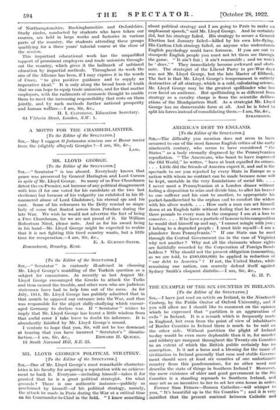AMERICA'S DEBT TO ENGLAND.
[To the Editor of the SPECTATOR.] Sor,—The difficulty you mention does not seem to have occurred to one of the most famous English critics of the.early nineteenth century, who seems to have considered " the States " as a body eternally disgraced by the Pennsylvanian repudiation. " The Americans, who boast to have improved the Old World," he writes, " have at least equalled its crimes. . . . Little did the friends of America expect it, and sad is the spectacle to see you rejected by every State in Europe as a nation with whom no contract can be made because none will be kept, unstable in the very foundations of social life. . . . I never meet a Pennsylvanian at a London dinner without feeling a disposition to seize and divide bin, to allot his beaver to one sufferer and his coat to another, to appropriate his pocket-handkerchief to the orphan and to comfort the widow with his silver watch. . . . How such a man can set himself down at an English table without feeling that he owes two or three potions to every man in the company I am at a loss to conceive. . . . If he have a particle of honour in his composition he would shut himself up and say, I cannot mingle with you ; I belong to a degraded people ; I must hide myself—I am a plunderer from Pennsylvania." If one State can be sued through the Central Government (as in the case of Virginia) why not another ? Why not all the claimants whose rights are faithfully recorded by the Corporation of Foreign Bond- holders ? Why should not the present obligation (amounting, as we are told, to £180,000,000) be applied in reduction of " our debt to America " ? If not, the United States, while remaining one nation, can scarcely defend itself against Sydney Smith's eloquent diatribe.—I am, Sir, &c.,
G. H. P.










































 Previous page
Previous page